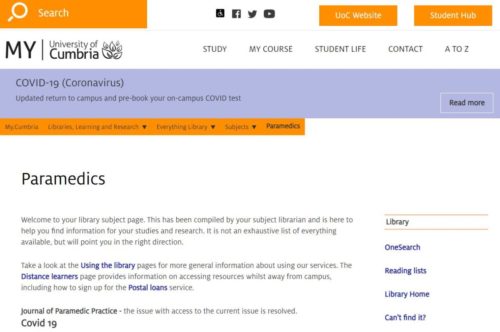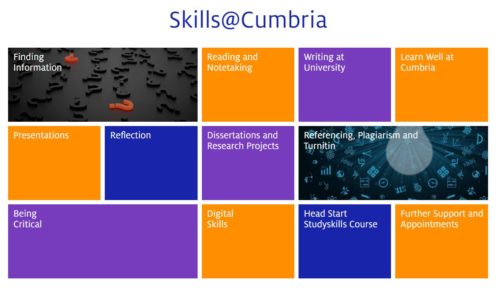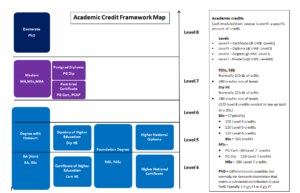MyCumbria – this is the resource page, specifically for Paramedics, includes academic skills tools, library access, links to other learning resources.
More specifically Skills@Cumbria has the links to study skills and other resources for supporting the completion of the portfolio, reflection and academic writing.
The resources are free & accessible to all in the non-accredited form. The toolkit covers topics such as:
- Finding information
- Reading & note-taking
- Writing at University
- Presentations
- reflection
- Dissertations & Research projects
- Referencing, plagiarism & tuition
- Being critical
- Digital Skills
- Headstart study skills course
You can continue to access the ‘Head Start’ courses by visiting
HEADSTART – Undergraduate – non-certificated
HEADSTART – Post Grad- non-certificated.
Please be aware that this version will not be offering any badges or certification.
When reading around your subject, it’s really important to use academic-level resources and not just websites you’ve found through Google. All of your reference lists should show that you have drawn information and ideas from a range of sources including books, journal articles and appropriate websites.
Academic reading is very different to everyday reading because it is more of an active process. Whilst studying at University you will have a higher quantity of reading and you will need to be able to grasp the main ideas, theories, key themes and arguments. To help you to focus and make your reading more active, identify what you want to find out from your reading before you start.
You may be reading to discover:
• Background information or context
• Previous or most recent research on a defined area
• Theories or methods to underpin your work
• A range of perspectives to gain a balanced view before you start writing
Academic writing is a particular style used in formal essays and other assessments for your course. It requires formal language, a logical structure and should be supported by evidence. It is a skill that you will need to learn and develop across your time at University. Make sure you use the information in your module guides and feedback from your lecturers to improve, you may also have workshops included as part of your course.
While you are at University you will probably be asked either individually or as a group, to make a presentation of some kind. These can be either quite informal:
- to introduce yourself to other members of your class
- to give you experience of working and communicating as a group
Or more formal with either rules or guidance applied:
- assessed multimedia presentation using PowerPoint or similar tools
- assessed verbal presentation
- assessed poster presentation
- conference paper or poster
You are likely to be asked to produce a piece of reflective writing at some point during your course and, depending on your subject area, reflection may be something that you are expected to do regularly.
There are many different models of reflection and your course tutor may ask you to follow a particular one or you may be asked to pick one to use yourself.
Dissertations offer you a great opportunity to investigate a topic of particular interest to you with a view to discovering new knowledge or practice. Dissertations usually fall into one of two main types;
- Research based i.e. you carry out a piece of original research as part of your study.
- Review or audit. This could be a detailed literature review perhaps combined with reflective practice and asking for recommendations to develop a new idea, procedure or policy.
Whilst studying at university you will need to refer to information from books, websites, journals and other sources in your assignments. You must acknowledge or ‘cite’ this information in your work and include full details in your list of references.
If you don’t do this correctly, you could be accused of stealing other people’s ideas or words and trying to pass them off as your own. This is known as plagiarism. You also need to reference your own work if you quote yourself from a previous piece of work you have done.
Critical thinking is one of the cornerstones of Higher Education. So what is it? It’s not just an academic exercise, it’s something we do in everyday life. For example, when shopping we compare products for quality and price before making our choice.
The ability to take a step back and question every aspect underpins academic critical thinking.
In this section you will find all of the main areas of digital skills for which UoC have resources available.
You can also use the site search, at the top of every My.Cumbria page, to locate specific help and you are encouraged to explore Linkedin Learning which will have a short course or video to support your needs.
CPD modules from Higher Education Institutes (HEIs) are mainly drawn from Health & Care Degree (BSc) or Masters (MSc) programmes. The programmes are made up of modular courses that add together to give enough credits to claim the award at the end.
Click the image below to see a Higher Education Qualification credit map
They are sometimes offered as a CPD module so people can either study a particular subject they are interested in as a standalone subject, or people can ‘module gather’ at their own pace and claim a generic award when they have enough credits. (If you don’t complete all the specific modules specified for a Programme, you cannot claim that award, but you can claim a generic award). e.g. You could complete a mix of modules from a Nursing degree and a Paramedic science degree; with enough credits then claim a Health & Social Care BSc. But you would need to complete the compulsory modules listed in the Nursing / Paramedic Science degree , and complete the placement to claim the specific degree. You would still have a valid BSc, just not in that specific subject, (and you would not be able to register as a professional in that field).
When it comes to a Masters pathway or programme, you have entered the realm of the Post Graduate. This can be different at different HEIs. Some will allow you to start a MSc pathway without a BSc, other will require you to have completed a BSc.
You can use a proportion of BSc credits towards a post graduate qualification, but you will need mainly MSc credits. This will depend on the HEI and the pathway.
Once you begin on a Post graduate (PG) pathway, you can ‘cash in’ your credits and ‘step off’ the pathway at certain points. You can stop and claim a Post Graduate Certificate (PG Cert), then a Post Graduate Diploma (PG Dip), and then finally a full Masters award (MSc).
Then, if you still have a family life and any sanity left, you can start looking at a Post Graduate Doctorate (PHd).



